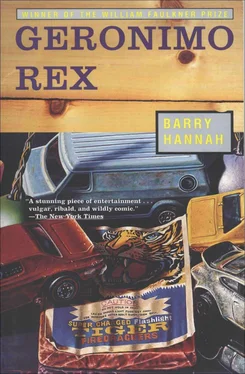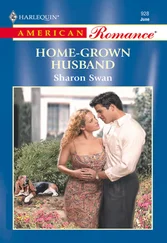“Here’s another one,” said Fleece. “You think you can make music breed with language and you end up sounding like Edgar Allan Poe playing the tuba.”
I stood up and wrote in some amending words; Mother Rooney rose with me and gave out encouraging mists as I wrote. “Now it’s a good poem,” said Fleece. “Let’s go on to the next.” He read a few lines and raised his head. “This is deep, you get on down there. Nightmares. Let me tell you one I’ve had three times. I’m with four other men in a motel room. We kick Bet Henderson around. Then we agree to rape her.”
“Goodness!” said Mother Rooney, leaving the room. Fleece watched her, holding his tongue.
“We all sleep. She gets up and murders the other four, who are tall fellows. She chokes one, she drives a hatpin into another one, she smothers one with a pillow, she be-heads one with a cleaver. I hear their screams but just lie there. She has an opaque brassiere on. Lipstick is smeared all over her face. She comes toward me, not to hurt me, but to tell me how tired she is, she wants a kiss. I pick up a long knife and drive it in her breasts. I look down and see her hand holding mine, lightly, like on the first date. She speaks to me. She says she is giving me a choice of waking up or staying close to her with this hand in the dream.”
Fleece seemed to be appealing to me for some answer. He held the sheet with my poem about the crab to his chest. He smiled and nodded toward the kitchen. A piece of skirt was showing behind the door frame. She must’ve been huddled against the refrigerator.
“See you. Come on out, Mother Rooney.” She swept out, holding her hands, timid on being discovered, but wanting to say something.
“Dear boys,” she said. “Could I ask you if this writing about nightmares is what is poetry ? I thought poetry was about man’s noblest aspirations.” She sat on the couch.
“Monroe has a poem in which a crab chewing peppermint gum is the hero.”
She settled into the couch. “Yes child, read it. I won’t say anything. I would just like to know how that one ends.”
The phone rang at eleven. Mother Rooney was bedded down. You could hear her bedside clock. Fleece took my manuscript on to his room. It was just me and the phone. I told him it was Harriman Monroe speaking.
“Catherine is not here. I never see her. She’s at the school or she’s with Lock. She doesn’t come in at night, and often several nights in a row. Lock has wanted your address. She knows your address. She carries these cards in her purse, the Ku Klux Klan and The Americans For The Preservation Of The White Race.”
“You taught her that kind of shit.”
“Not these organizations. I have said things I regret saying in Lock’s presence. He is the one who will take it out to foolishness. There is Catherine’s nose. It remains damaged so that she snores when she sleeps.”
“Are you saying Lock is after me? Make sense.”
“He is a different order. You remember in nineteen sixty-four, the summer the Northern boys were killed near Philadelphia, the Civil Rights killing—”
“Lock was in on that?”
“No. He says he has friends who knew something about it. I didn’t want to know what he was trying to tell me. There was the bombing of the real estate office here in Jackson. The same. His friends.”
“Everything you would want in a son-in-law.”
“He is not. You cared enough about her to see her at the Reservoir last summer. If you could be here one evening when she gets back from teaching. Not as her paramour, but as—”
“What? I don’t trust you. I’m not coming over. Don’t think of me. You do something about her.”
I hung up. I walked to Bobby Dove’s room.
“No peace has been made?” asked Fleece.
“Stay armed,” I told him.
Later, as I was packing all my bachelor things and moving out, I called Fleece up and gave him the remainder of the.22 shells in the box. He took the automatic pistol which he had been so deadly with, and I took his long revolver, which had never been shot.
At Hedermansever, in the Chaucer class, was a good fellow named Tommy Neicase. We liked each other and generally drank coffee in the grill after class. Once a month or so Tommy would visit his father in Pascagoula. His father and mother were divorced, and his father owned a beach home walled with polished wood such as you might find in the steerhouse of an expensive boat His father always had him a girl waiting when he came home. The man had a job which allowed him to loiter hundreds of hours beside the desks of Pascagoula’s secretaries, who were mostly girls just out of high school. The old man had a sort of soft brassy manner, the action in Pascagoula was slow for the girls, so Tommy’s father didn’t have much trouble bringing even morally decent girls over to the house to meet Tommy. Tommy would get out of the car after the drive down from Hedermansever, and his father would put an iced drink in his hand and lead him out to the patio. Sitting on the chaise longue would be a girl he’d never seen before. She’d know what he was studying at college and be petting Tommy’s dog like it was an old friend.
The last time he’d gone to Pascagoula, the old man had put a drink in his hand but didn’t take him right out to the patio. He was worried, and took Tommy in the front of the house. He said something like “Well you see here, this little girl finished high school in two years, and she looks four-teen. I was just making talk with her over at Ingall’s Ship-yard, no idea she might, but I invited her, out of habit, and that was this afternoon and I didn’t have you a girl. She accepted and she’s out there drinking ginger ale waiting for you. I’m sorry. She’s too young. But be nice to her.”
When Tommy first saw her, she was sitting with one calf over a knee, petting his dog. She was what his father had said. She was a dago seeming about fourteen years old, very slight, and more than cute. He understood how his old man could’ve made the mistake. Her name was Prissy Lombardo. She fondled her ginger ale as if it was a very serious drink. She asked for a cigarette, and Tom’s father couldn’t get away quickly enough to avoid giving her one, though he did it with hesitation. The old man saw Tommy gazing at her. He saw Tom mixing a drink for two in the kitchen. “She makes me feel like a pimp, an awful one. Don’t you, as you are my son, start anything with her.”
At ten, Tommy drove her home. He found out she was almost seventeen. She lived in a rundown green-boarded house, mainly sand in the lawn; the driveway was made of oyster shells. She reached over and caught his cheeks and kissed him, longly. “Please call me up tomorrow, won’t you?” she said.
He intended to, but his old man caught him looking through the phone book. If Tom saw her again, he wouldn’t feel right about it. Mr. Neicase paid Tommy’s tuition and gave him enough extra money to make Tom feel obliged to him. This was the first and only time Mr. Neicase had tried to put any controls on him, and he respected it He did hate to see her go to waste, though.
I went down to Pascagoula an early weekend in October with Tom. Really a generous and splendid man, Tom, and so was his father. The house looked out to a hundred yards of gray sand and waves, coming in weakly like mopwater — the Gulf of Mexico, broken up by islands some miles out, smelling high of the marine dead. Breathing on the patio, that tepid breeze which filled your nose with salt and shrimp — I loved it. The house was like a ship broken apart here on the beach. We ate under a chandelier, the wallpaper was green and silver, and the light was always low. In Pascagoula, the town, there were cracked seawalls, gulls, avenues with palm-trees in the medians, and strange weather formations you could see out in the gulf; when you went downtown you saw a lot of dark men and women rattling to each other, and the shrimp-wind was pouring in all the time.
Читать дальше












